Democratic Rule: Core Features, Types, and Threats in the Modern Era
VerifiedAdded on 2021/05/30
|10
|2822
|158
Essay
AI Summary
This essay delves into the multifaceted concept of democratic rule, exploring its core features, diverse types, and the significant threats it encounters in the contemporary era. The essay begins by defining democratic rule and its foundational principles, emphasizing political contestation and participation. It then distinguishes between direct and representative democracies, further categorizing the latter into parliamentary, presidential, and mixed systems, providing detailed explanations of each. The essay highlights essential features of democratic rule, including the exercise of power and civic responsibility, respect for the rule of law, majority rule, individual rights, representative elections, and the values of cooperation and tolerance. Furthermore, it identifies and analyzes major threats to democracy, such as corruption, political apathy, oligarchy, and attacks on voting rights. The essay concludes by examining the challenges facing democracy today, including the impact of globalization, the rise of social media, and the unsustainable nature of debt-financed democracies. The essay draws upon the works of several scholars to support its arguments, providing a comprehensive overview of the subject.
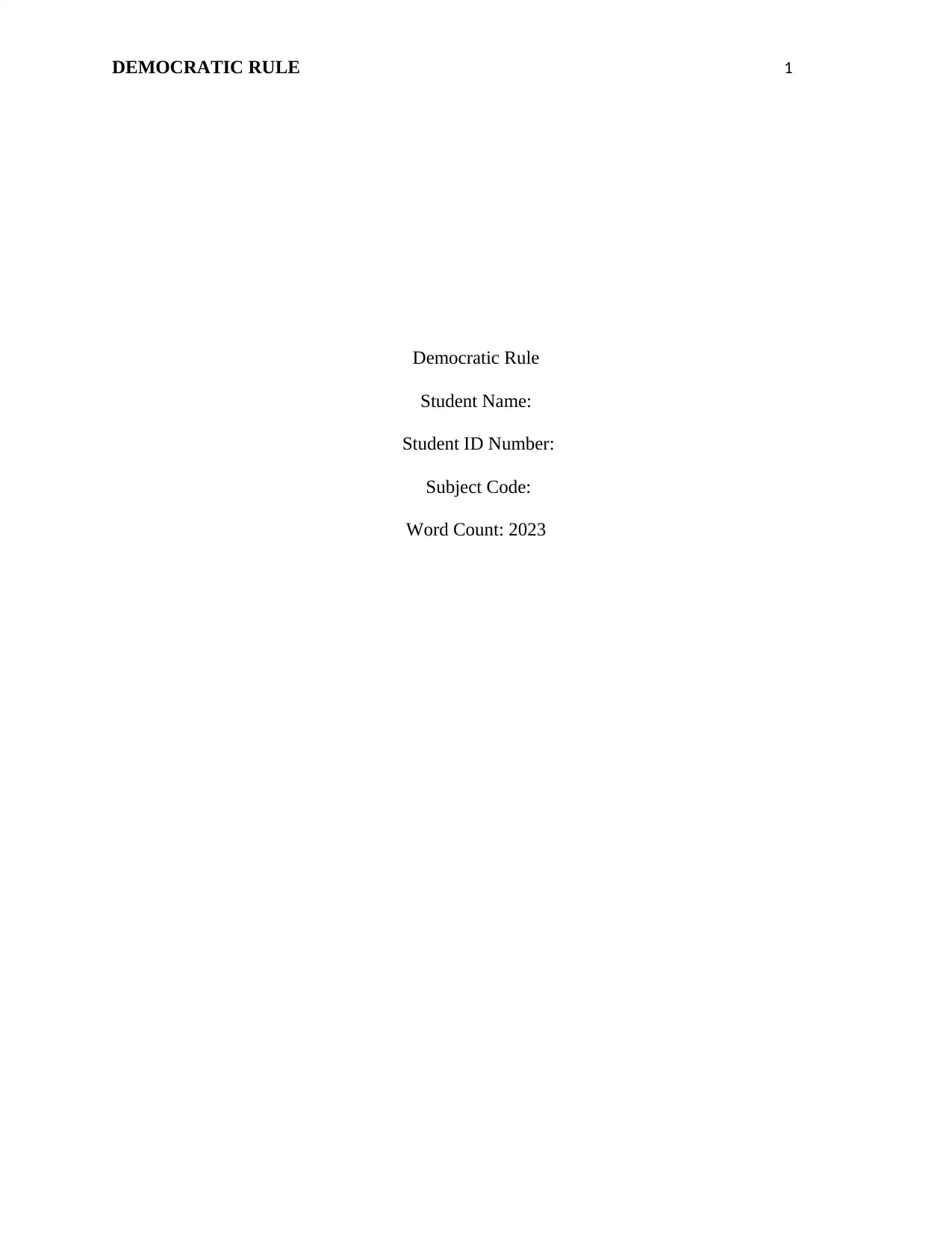
DEMOCRATIC RULE 1
Democratic Rule
Student Name:
Student ID Number:
Subject Code:
Word Count: 2023
Democratic Rule
Student Name:
Student ID Number:
Subject Code:
Word Count: 2023
Paraphrase This Document
Need a fresh take? Get an instant paraphrase of this document with our AI Paraphraser
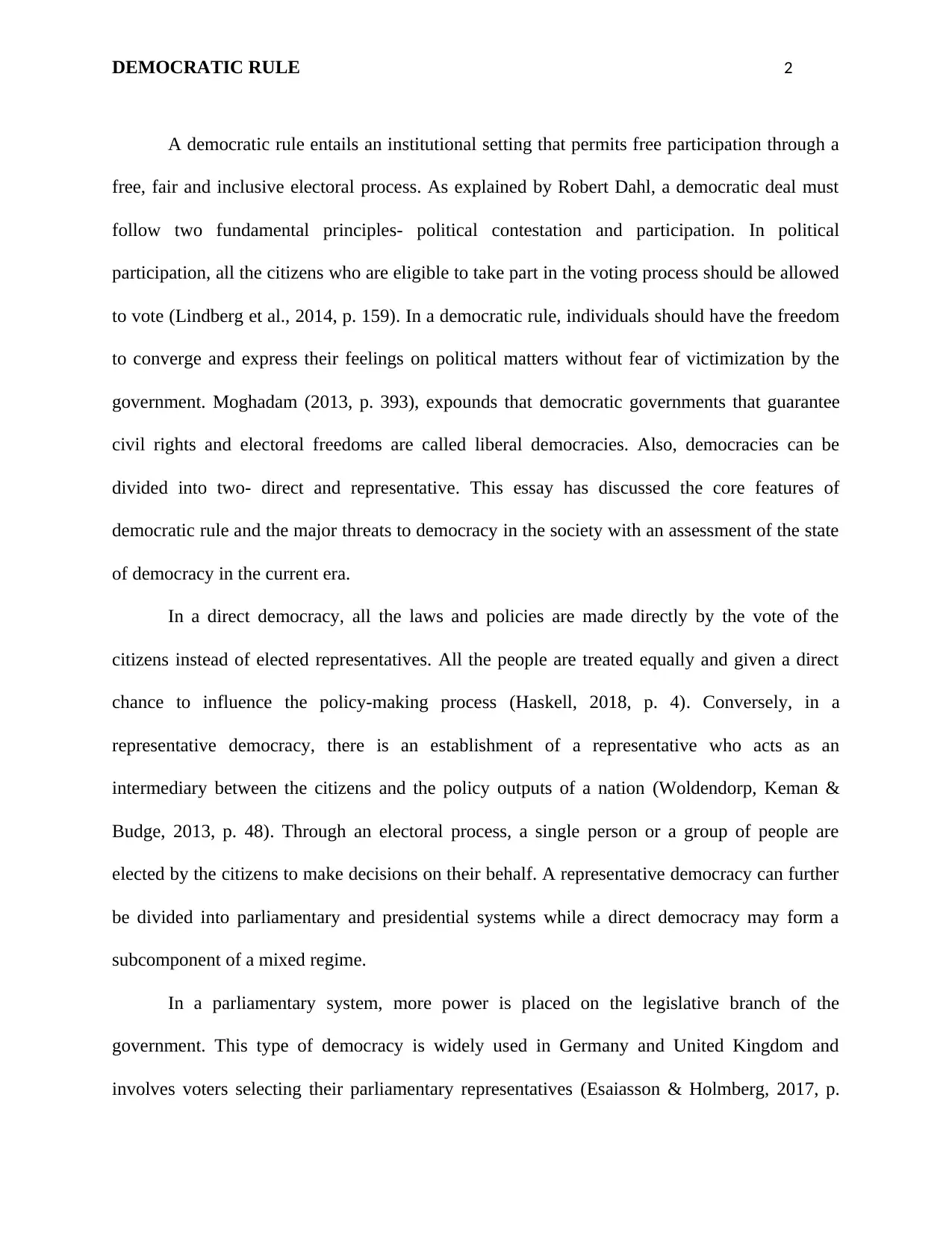
DEMOCRATIC RULE 2
A democratic rule entails an institutional setting that permits free participation through a
free, fair and inclusive electoral process. As explained by Robert Dahl, a democratic deal must
follow two fundamental principles- political contestation and participation. In political
participation, all the citizens who are eligible to take part in the voting process should be allowed
to vote (Lindberg et al., 2014, p. 159). In a democratic rule, individuals should have the freedom
to converge and express their feelings on political matters without fear of victimization by the
government. Moghadam (2013, p. 393), expounds that democratic governments that guarantee
civil rights and electoral freedoms are called liberal democracies. Also, democracies can be
divided into two- direct and representative. This essay has discussed the core features of
democratic rule and the major threats to democracy in the society with an assessment of the state
of democracy in the current era.
In a direct democracy, all the laws and policies are made directly by the vote of the
citizens instead of elected representatives. All the people are treated equally and given a direct
chance to influence the policy-making process (Haskell, 2018, p. 4). Conversely, in a
representative democracy, there is an establishment of a representative who acts as an
intermediary between the citizens and the policy outputs of a nation (Woldendorp, Keman &
Budge, 2013, p. 48). Through an electoral process, a single person or a group of people are
elected by the citizens to make decisions on their behalf. A representative democracy can further
be divided into parliamentary and presidential systems while a direct democracy may form a
subcomponent of a mixed regime.
In a parliamentary system, more power is placed on the legislative branch of the
government. This type of democracy is widely used in Germany and United Kingdom and
involves voters selecting their parliamentary representatives (Esaiasson & Holmberg, 2017, p.
A democratic rule entails an institutional setting that permits free participation through a
free, fair and inclusive electoral process. As explained by Robert Dahl, a democratic deal must
follow two fundamental principles- political contestation and participation. In political
participation, all the citizens who are eligible to take part in the voting process should be allowed
to vote (Lindberg et al., 2014, p. 159). In a democratic rule, individuals should have the freedom
to converge and express their feelings on political matters without fear of victimization by the
government. Moghadam (2013, p. 393), expounds that democratic governments that guarantee
civil rights and electoral freedoms are called liberal democracies. Also, democracies can be
divided into two- direct and representative. This essay has discussed the core features of
democratic rule and the major threats to democracy in the society with an assessment of the state
of democracy in the current era.
In a direct democracy, all the laws and policies are made directly by the vote of the
citizens instead of elected representatives. All the people are treated equally and given a direct
chance to influence the policy-making process (Haskell, 2018, p. 4). Conversely, in a
representative democracy, there is an establishment of a representative who acts as an
intermediary between the citizens and the policy outputs of a nation (Woldendorp, Keman &
Budge, 2013, p. 48). Through an electoral process, a single person or a group of people are
elected by the citizens to make decisions on their behalf. A representative democracy can further
be divided into parliamentary and presidential systems while a direct democracy may form a
subcomponent of a mixed regime.
In a parliamentary system, more power is placed on the legislative branch of the
government. This type of democracy is widely used in Germany and United Kingdom and
involves voters selecting their parliamentary representatives (Esaiasson & Holmberg, 2017, p.
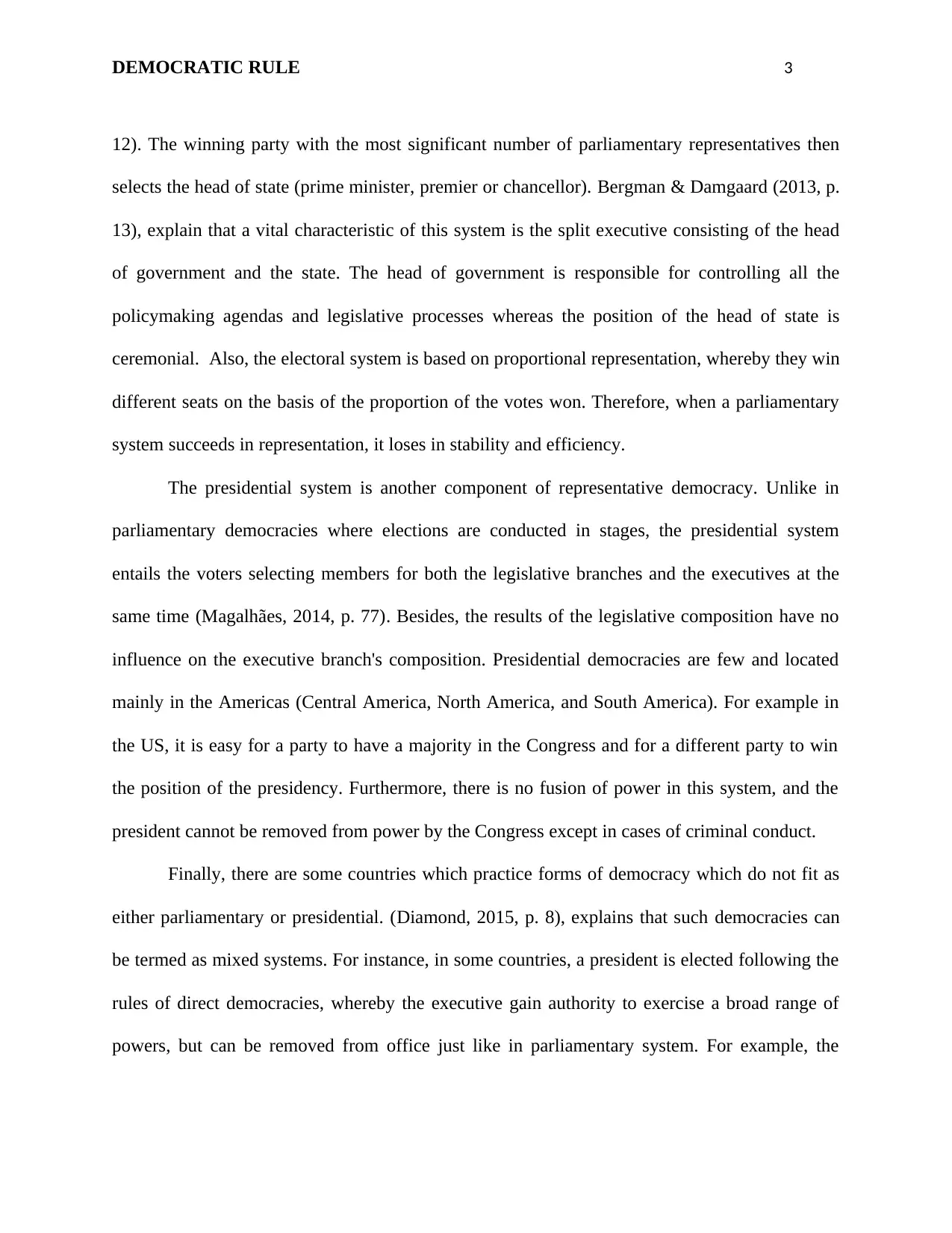
DEMOCRATIC RULE 3
12). The winning party with the most significant number of parliamentary representatives then
selects the head of state (prime minister, premier or chancellor). Bergman & Damgaard (2013, p.
13), explain that a vital characteristic of this system is the split executive consisting of the head
of government and the state. The head of government is responsible for controlling all the
policymaking agendas and legislative processes whereas the position of the head of state is
ceremonial. Also, the electoral system is based on proportional representation, whereby they win
different seats on the basis of the proportion of the votes won. Therefore, when a parliamentary
system succeeds in representation, it loses in stability and efficiency.
The presidential system is another component of representative democracy. Unlike in
parliamentary democracies where elections are conducted in stages, the presidential system
entails the voters selecting members for both the legislative branches and the executives at the
same time (Magalhães, 2014, p. 77). Besides, the results of the legislative composition have no
influence on the executive branch's composition. Presidential democracies are few and located
mainly in the Americas (Central America, North America, and South America). For example in
the US, it is easy for a party to have a majority in the Congress and for a different party to win
the position of the presidency. Furthermore, there is no fusion of power in this system, and the
president cannot be removed from power by the Congress except in cases of criminal conduct.
Finally, there are some countries which practice forms of democracy which do not fit as
either parliamentary or presidential. (Diamond, 2015, p. 8), explains that such democracies can
be termed as mixed systems. For instance, in some countries, a president is elected following the
rules of direct democracies, whereby the executive gain authority to exercise a broad range of
powers, but can be removed from office just like in parliamentary system. For example, the
12). The winning party with the most significant number of parliamentary representatives then
selects the head of state (prime minister, premier or chancellor). Bergman & Damgaard (2013, p.
13), explain that a vital characteristic of this system is the split executive consisting of the head
of government and the state. The head of government is responsible for controlling all the
policymaking agendas and legislative processes whereas the position of the head of state is
ceremonial. Also, the electoral system is based on proportional representation, whereby they win
different seats on the basis of the proportion of the votes won. Therefore, when a parliamentary
system succeeds in representation, it loses in stability and efficiency.
The presidential system is another component of representative democracy. Unlike in
parliamentary democracies where elections are conducted in stages, the presidential system
entails the voters selecting members for both the legislative branches and the executives at the
same time (Magalhães, 2014, p. 77). Besides, the results of the legislative composition have no
influence on the executive branch's composition. Presidential democracies are few and located
mainly in the Americas (Central America, North America, and South America). For example in
the US, it is easy for a party to have a majority in the Congress and for a different party to win
the position of the presidency. Furthermore, there is no fusion of power in this system, and the
president cannot be removed from power by the Congress except in cases of criminal conduct.
Finally, there are some countries which practice forms of democracy which do not fit as
either parliamentary or presidential. (Diamond, 2015, p. 8), explains that such democracies can
be termed as mixed systems. For instance, in some countries, a president is elected following the
rules of direct democracies, whereby the executive gain authority to exercise a broad range of
powers, but can be removed from office just like in parliamentary system. For example, the
⊘ This is a preview!⊘
Do you want full access?
Subscribe today to unlock all pages.

Trusted by 1+ million students worldwide
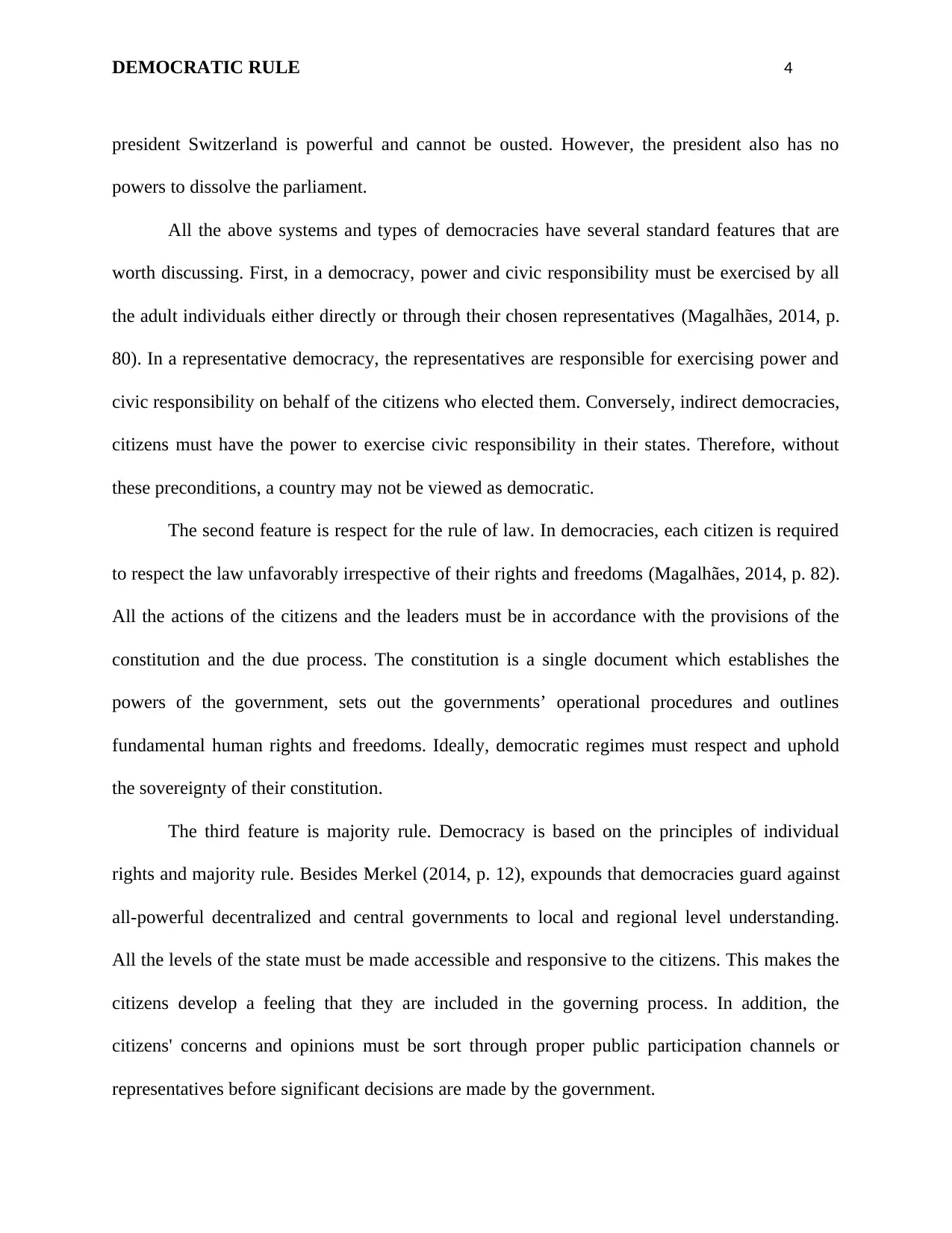
DEMOCRATIC RULE 4
president Switzerland is powerful and cannot be ousted. However, the president also has no
powers to dissolve the parliament.
All the above systems and types of democracies have several standard features that are
worth discussing. First, in a democracy, power and civic responsibility must be exercised by all
the adult individuals either directly or through their chosen representatives (Magalhães, 2014, p.
80). In a representative democracy, the representatives are responsible for exercising power and
civic responsibility on behalf of the citizens who elected them. Conversely, indirect democracies,
citizens must have the power to exercise civic responsibility in their states. Therefore, without
these preconditions, a country may not be viewed as democratic.
The second feature is respect for the rule of law. In democracies, each citizen is required
to respect the law unfavorably irrespective of their rights and freedoms (Magalhães, 2014, p. 82).
All the actions of the citizens and the leaders must be in accordance with the provisions of the
constitution and the due process. The constitution is a single document which establishes the
powers of the government, sets out the governments’ operational procedures and outlines
fundamental human rights and freedoms. Ideally, democratic regimes must respect and uphold
the sovereignty of their constitution.
The third feature is majority rule. Democracy is based on the principles of individual
rights and majority rule. Besides Merkel (2014, p. 12), expounds that democracies guard against
all-powerful decentralized and central governments to local and regional level understanding.
All the levels of the state must be made accessible and responsive to the citizens. This makes the
citizens develop a feeling that they are included in the governing process. In addition, the
citizens' concerns and opinions must be sort through proper public participation channels or
representatives before significant decisions are made by the government.
president Switzerland is powerful and cannot be ousted. However, the president also has no
powers to dissolve the parliament.
All the above systems and types of democracies have several standard features that are
worth discussing. First, in a democracy, power and civic responsibility must be exercised by all
the adult individuals either directly or through their chosen representatives (Magalhães, 2014, p.
80). In a representative democracy, the representatives are responsible for exercising power and
civic responsibility on behalf of the citizens who elected them. Conversely, indirect democracies,
citizens must have the power to exercise civic responsibility in their states. Therefore, without
these preconditions, a country may not be viewed as democratic.
The second feature is respect for the rule of law. In democracies, each citizen is required
to respect the law unfavorably irrespective of their rights and freedoms (Magalhães, 2014, p. 82).
All the actions of the citizens and the leaders must be in accordance with the provisions of the
constitution and the due process. The constitution is a single document which establishes the
powers of the government, sets out the governments’ operational procedures and outlines
fundamental human rights and freedoms. Ideally, democratic regimes must respect and uphold
the sovereignty of their constitution.
The third feature is majority rule. Democracy is based on the principles of individual
rights and majority rule. Besides Merkel (2014, p. 12), expounds that democracies guard against
all-powerful decentralized and central governments to local and regional level understanding.
All the levels of the state must be made accessible and responsive to the citizens. This makes the
citizens develop a feeling that they are included in the governing process. In addition, the
citizens' concerns and opinions must be sort through proper public participation channels or
representatives before significant decisions are made by the government.
Paraphrase This Document
Need a fresh take? Get an instant paraphrase of this document with our AI Paraphraser
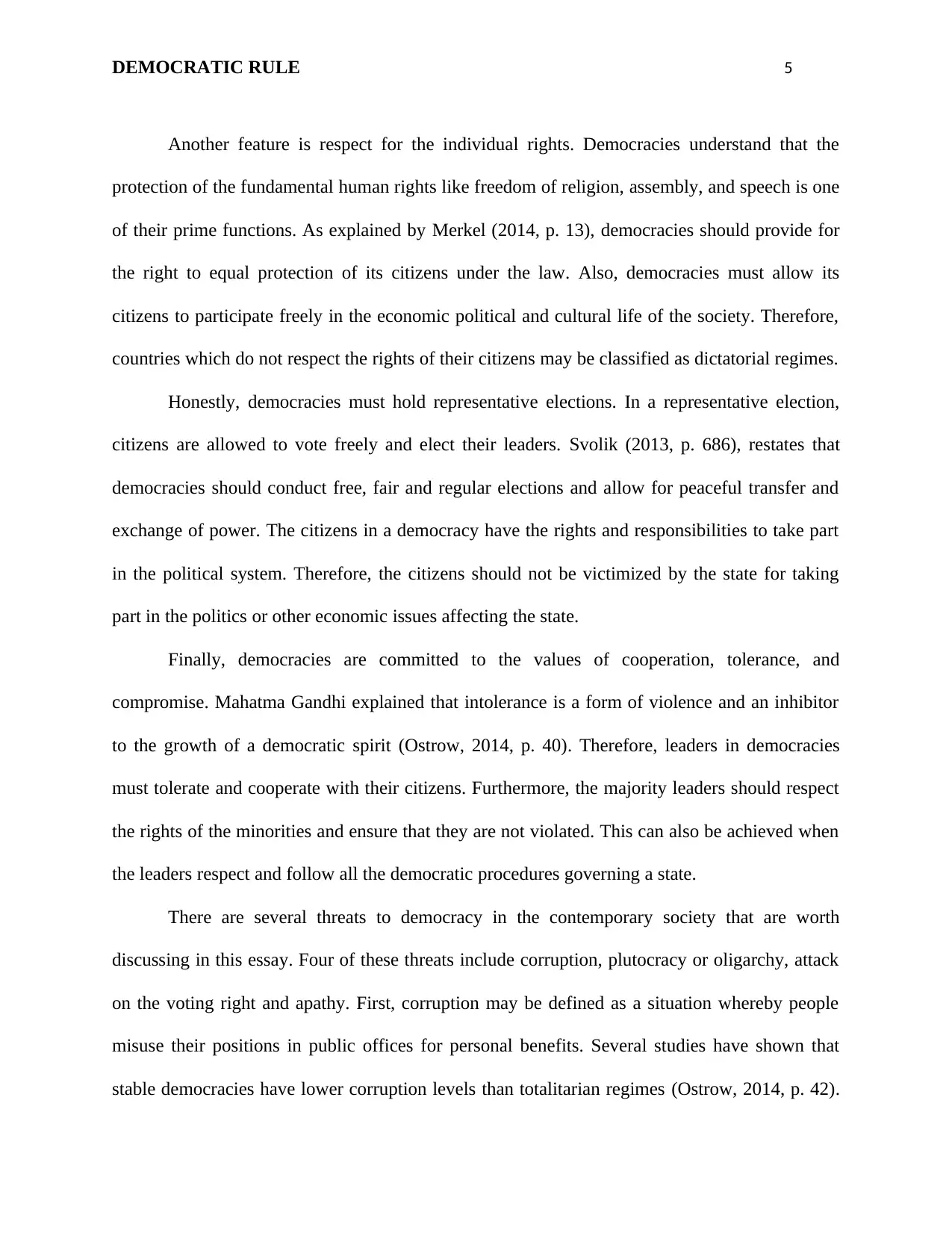
DEMOCRATIC RULE 5
Another feature is respect for the individual rights. Democracies understand that the
protection of the fundamental human rights like freedom of religion, assembly, and speech is one
of their prime functions. As explained by Merkel (2014, p. 13), democracies should provide for
the right to equal protection of its citizens under the law. Also, democracies must allow its
citizens to participate freely in the economic political and cultural life of the society. Therefore,
countries which do not respect the rights of their citizens may be classified as dictatorial regimes.
Honestly, democracies must hold representative elections. In a representative election,
citizens are allowed to vote freely and elect their leaders. Svolik (2013, p. 686), restates that
democracies should conduct free, fair and regular elections and allow for peaceful transfer and
exchange of power. The citizens in a democracy have the rights and responsibilities to take part
in the political system. Therefore, the citizens should not be victimized by the state for taking
part in the politics or other economic issues affecting the state.
Finally, democracies are committed to the values of cooperation, tolerance, and
compromise. Mahatma Gandhi explained that intolerance is a form of violence and an inhibitor
to the growth of a democratic spirit (Ostrow, 2014, p. 40). Therefore, leaders in democracies
must tolerate and cooperate with their citizens. Furthermore, the majority leaders should respect
the rights of the minorities and ensure that they are not violated. This can also be achieved when
the leaders respect and follow all the democratic procedures governing a state.
There are several threats to democracy in the contemporary society that are worth
discussing in this essay. Four of these threats include corruption, plutocracy or oligarchy, attack
on the voting right and apathy. First, corruption may be defined as a situation whereby people
misuse their positions in public offices for personal benefits. Several studies have shown that
stable democracies have lower corruption levels than totalitarian regimes (Ostrow, 2014, p. 42).
Another feature is respect for the individual rights. Democracies understand that the
protection of the fundamental human rights like freedom of religion, assembly, and speech is one
of their prime functions. As explained by Merkel (2014, p. 13), democracies should provide for
the right to equal protection of its citizens under the law. Also, democracies must allow its
citizens to participate freely in the economic political and cultural life of the society. Therefore,
countries which do not respect the rights of their citizens may be classified as dictatorial regimes.
Honestly, democracies must hold representative elections. In a representative election,
citizens are allowed to vote freely and elect their leaders. Svolik (2013, p. 686), restates that
democracies should conduct free, fair and regular elections and allow for peaceful transfer and
exchange of power. The citizens in a democracy have the rights and responsibilities to take part
in the political system. Therefore, the citizens should not be victimized by the state for taking
part in the politics or other economic issues affecting the state.
Finally, democracies are committed to the values of cooperation, tolerance, and
compromise. Mahatma Gandhi explained that intolerance is a form of violence and an inhibitor
to the growth of a democratic spirit (Ostrow, 2014, p. 40). Therefore, leaders in democracies
must tolerate and cooperate with their citizens. Furthermore, the majority leaders should respect
the rights of the minorities and ensure that they are not violated. This can also be achieved when
the leaders respect and follow all the democratic procedures governing a state.
There are several threats to democracy in the contemporary society that are worth
discussing in this essay. Four of these threats include corruption, plutocracy or oligarchy, attack
on the voting right and apathy. First, corruption may be defined as a situation whereby people
misuse their positions in public offices for personal benefits. Several studies have shown that
stable democracies have lower corruption levels than totalitarian regimes (Ostrow, 2014, p. 42).
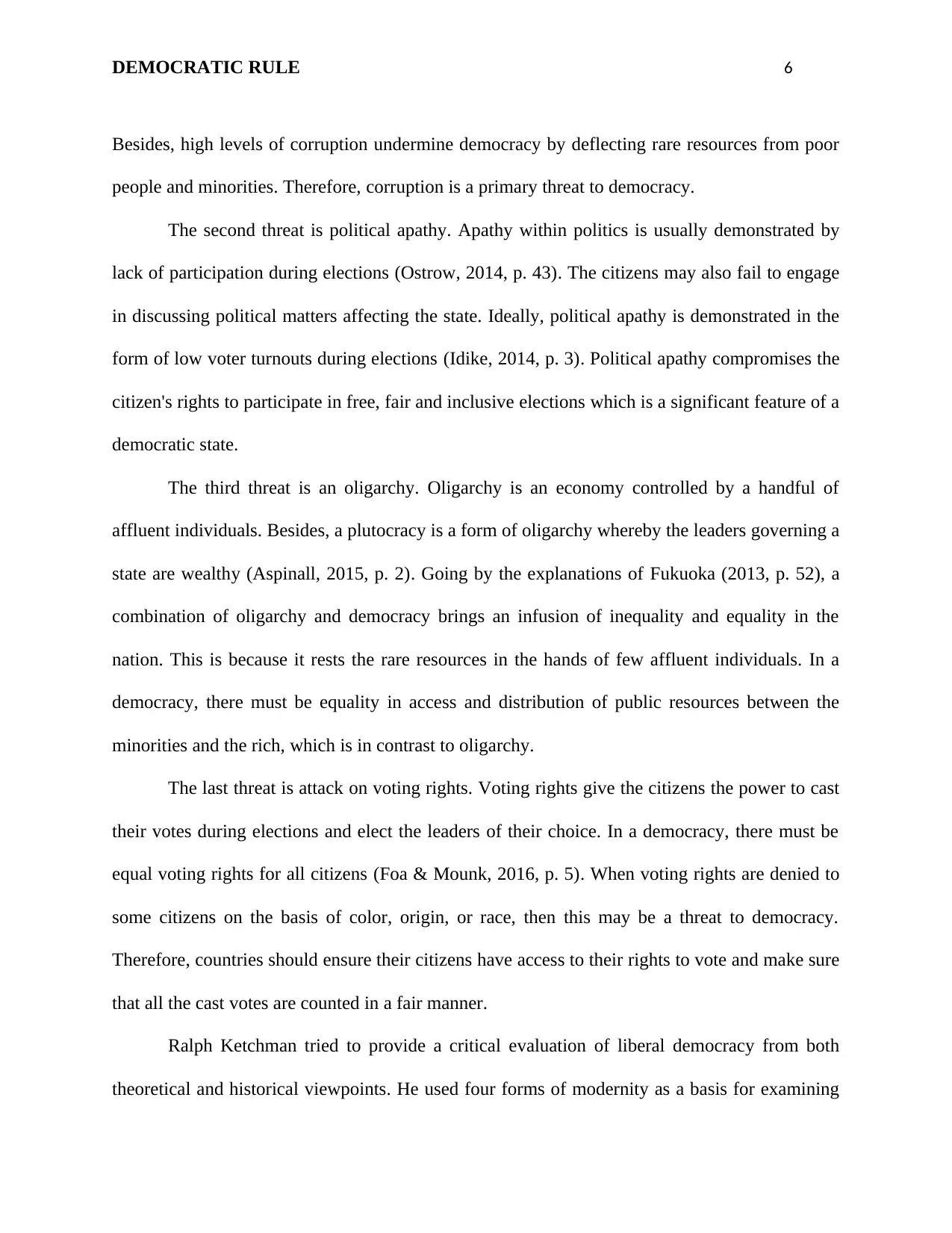
DEMOCRATIC RULE 6
Besides, high levels of corruption undermine democracy by deflecting rare resources from poor
people and minorities. Therefore, corruption is a primary threat to democracy.
The second threat is political apathy. Apathy within politics is usually demonstrated by
lack of participation during elections (Ostrow, 2014, p. 43). The citizens may also fail to engage
in discussing political matters affecting the state. Ideally, political apathy is demonstrated in the
form of low voter turnouts during elections (Idike, 2014, p. 3). Political apathy compromises the
citizen's rights to participate in free, fair and inclusive elections which is a significant feature of a
democratic state.
The third threat is an oligarchy. Oligarchy is an economy controlled by a handful of
affluent individuals. Besides, a plutocracy is a form of oligarchy whereby the leaders governing a
state are wealthy (Aspinall, 2015, p. 2). Going by the explanations of Fukuoka (2013, p. 52), a
combination of oligarchy and democracy brings an infusion of inequality and equality in the
nation. This is because it rests the rare resources in the hands of few affluent individuals. In a
democracy, there must be equality in access and distribution of public resources between the
minorities and the rich, which is in contrast to oligarchy.
The last threat is attack on voting rights. Voting rights give the citizens the power to cast
their votes during elections and elect the leaders of their choice. In a democracy, there must be
equal voting rights for all citizens (Foa & Mounk, 2016, p. 5). When voting rights are denied to
some citizens on the basis of color, origin, or race, then this may be a threat to democracy.
Therefore, countries should ensure their citizens have access to their rights to vote and make sure
that all the cast votes are counted in a fair manner.
Ralph Ketchman tried to provide a critical evaluation of liberal democracy from both
theoretical and historical viewpoints. He used four forms of modernity as a basis for examining
Besides, high levels of corruption undermine democracy by deflecting rare resources from poor
people and minorities. Therefore, corruption is a primary threat to democracy.
The second threat is political apathy. Apathy within politics is usually demonstrated by
lack of participation during elections (Ostrow, 2014, p. 43). The citizens may also fail to engage
in discussing political matters affecting the state. Ideally, political apathy is demonstrated in the
form of low voter turnouts during elections (Idike, 2014, p. 3). Political apathy compromises the
citizen's rights to participate in free, fair and inclusive elections which is a significant feature of a
democratic state.
The third threat is an oligarchy. Oligarchy is an economy controlled by a handful of
affluent individuals. Besides, a plutocracy is a form of oligarchy whereby the leaders governing a
state are wealthy (Aspinall, 2015, p. 2). Going by the explanations of Fukuoka (2013, p. 52), a
combination of oligarchy and democracy brings an infusion of inequality and equality in the
nation. This is because it rests the rare resources in the hands of few affluent individuals. In a
democracy, there must be equality in access and distribution of public resources between the
minorities and the rich, which is in contrast to oligarchy.
The last threat is attack on voting rights. Voting rights give the citizens the power to cast
their votes during elections and elect the leaders of their choice. In a democracy, there must be
equal voting rights for all citizens (Foa & Mounk, 2016, p. 5). When voting rights are denied to
some citizens on the basis of color, origin, or race, then this may be a threat to democracy.
Therefore, countries should ensure their citizens have access to their rights to vote and make sure
that all the cast votes are counted in a fair manner.
Ralph Ketchman tried to provide a critical evaluation of liberal democracy from both
theoretical and historical viewpoints. He used four forms of modernity as a basis for examining
⊘ This is a preview!⊘
Do you want full access?
Subscribe today to unlock all pages.

Trusted by 1+ million students worldwide
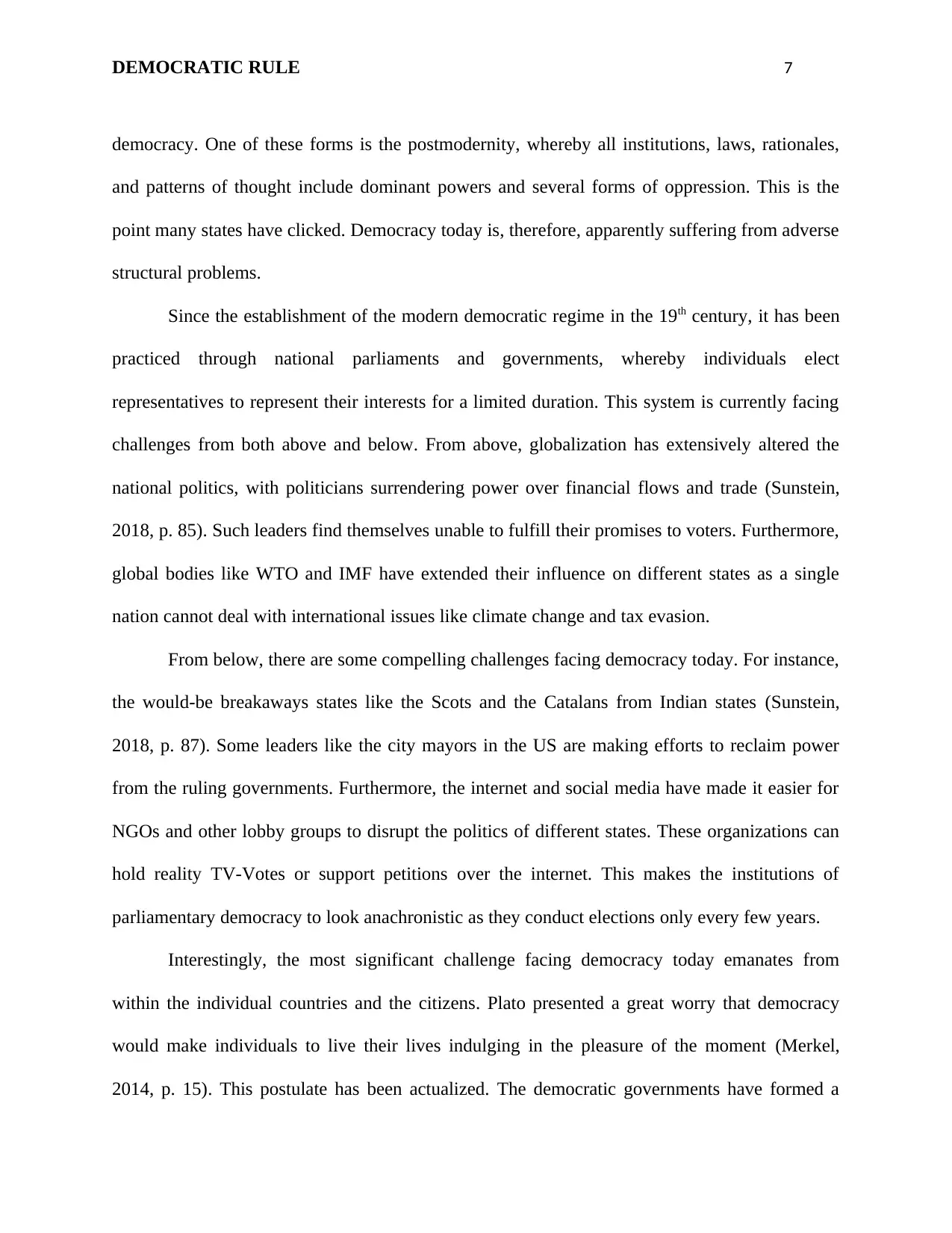
DEMOCRATIC RULE 7
democracy. One of these forms is the postmodernity, whereby all institutions, laws, rationales,
and patterns of thought include dominant powers and several forms of oppression. This is the
point many states have clicked. Democracy today is, therefore, apparently suffering from adverse
structural problems.
Since the establishment of the modern democratic regime in the 19th century, it has been
practiced through national parliaments and governments, whereby individuals elect
representatives to represent their interests for a limited duration. This system is currently facing
challenges from both above and below. From above, globalization has extensively altered the
national politics, with politicians surrendering power over financial flows and trade (Sunstein,
2018, p. 85). Such leaders find themselves unable to fulfill their promises to voters. Furthermore,
global bodies like WTO and IMF have extended their influence on different states as a single
nation cannot deal with international issues like climate change and tax evasion.
From below, there are some compelling challenges facing democracy today. For instance,
the would-be breakaways states like the Scots and the Catalans from Indian states (Sunstein,
2018, p. 87). Some leaders like the city mayors in the US are making efforts to reclaim power
from the ruling governments. Furthermore, the internet and social media have made it easier for
NGOs and other lobby groups to disrupt the politics of different states. These organizations can
hold reality TV-Votes or support petitions over the internet. This makes the institutions of
parliamentary democracy to look anachronistic as they conduct elections only every few years.
Interestingly, the most significant challenge facing democracy today emanates from
within the individual countries and the citizens. Plato presented a great worry that democracy
would make individuals to live their lives indulging in the pleasure of the moment (Merkel,
2014, p. 15). This postulate has been actualized. The democratic governments have formed a
democracy. One of these forms is the postmodernity, whereby all institutions, laws, rationales,
and patterns of thought include dominant powers and several forms of oppression. This is the
point many states have clicked. Democracy today is, therefore, apparently suffering from adverse
structural problems.
Since the establishment of the modern democratic regime in the 19th century, it has been
practiced through national parliaments and governments, whereby individuals elect
representatives to represent their interests for a limited duration. This system is currently facing
challenges from both above and below. From above, globalization has extensively altered the
national politics, with politicians surrendering power over financial flows and trade (Sunstein,
2018, p. 85). Such leaders find themselves unable to fulfill their promises to voters. Furthermore,
global bodies like WTO and IMF have extended their influence on different states as a single
nation cannot deal with international issues like climate change and tax evasion.
From below, there are some compelling challenges facing democracy today. For instance,
the would-be breakaways states like the Scots and the Catalans from Indian states (Sunstein,
2018, p. 87). Some leaders like the city mayors in the US are making efforts to reclaim power
from the ruling governments. Furthermore, the internet and social media have made it easier for
NGOs and other lobby groups to disrupt the politics of different states. These organizations can
hold reality TV-Votes or support petitions over the internet. This makes the institutions of
parliamentary democracy to look anachronistic as they conduct elections only every few years.
Interestingly, the most significant challenge facing democracy today emanates from
within the individual countries and the citizens. Plato presented a great worry that democracy
would make individuals to live their lives indulging in the pleasure of the moment (Merkel,
2014, p. 15). This postulate has been actualized. The democratic governments have formed a
Paraphrase This Document
Need a fresh take? Get an instant paraphrase of this document with our AI Paraphraser
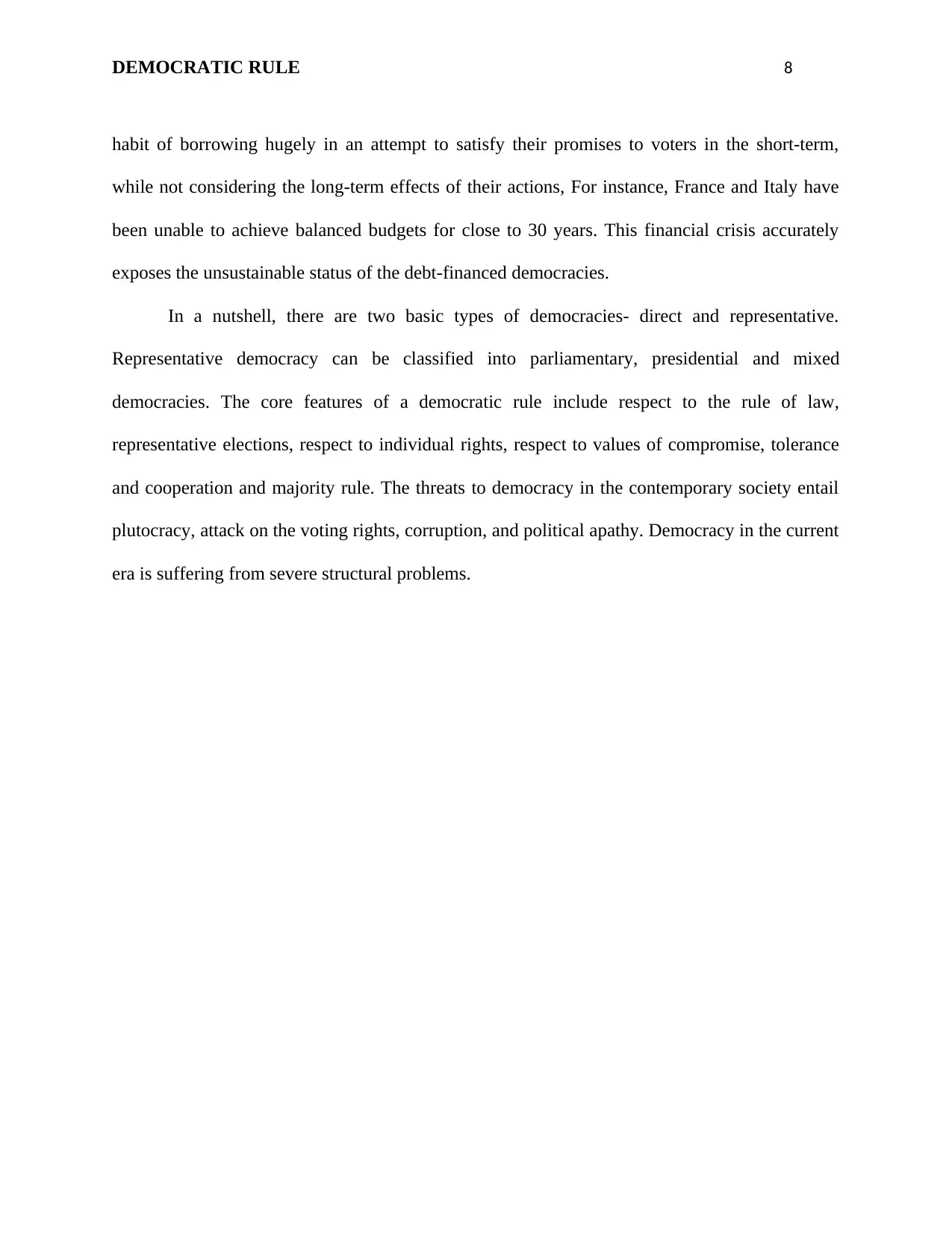
DEMOCRATIC RULE 8
habit of borrowing hugely in an attempt to satisfy their promises to voters in the short-term,
while not considering the long-term effects of their actions, For instance, France and Italy have
been unable to achieve balanced budgets for close to 30 years. This financial crisis accurately
exposes the unsustainable status of the debt-financed democracies.
In a nutshell, there are two basic types of democracies- direct and representative.
Representative democracy can be classified into parliamentary, presidential and mixed
democracies. The core features of a democratic rule include respect to the rule of law,
representative elections, respect to individual rights, respect to values of compromise, tolerance
and cooperation and majority rule. The threats to democracy in the contemporary society entail
plutocracy, attack on the voting rights, corruption, and political apathy. Democracy in the current
era is suffering from severe structural problems.
habit of borrowing hugely in an attempt to satisfy their promises to voters in the short-term,
while not considering the long-term effects of their actions, For instance, France and Italy have
been unable to achieve balanced budgets for close to 30 years. This financial crisis accurately
exposes the unsustainable status of the debt-financed democracies.
In a nutshell, there are two basic types of democracies- direct and representative.
Representative democracy can be classified into parliamentary, presidential and mixed
democracies. The core features of a democratic rule include respect to the rule of law,
representative elections, respect to individual rights, respect to values of compromise, tolerance
and cooperation and majority rule. The threats to democracy in the contemporary society entail
plutocracy, attack on the voting rights, corruption, and political apathy. Democracy in the current
era is suffering from severe structural problems.
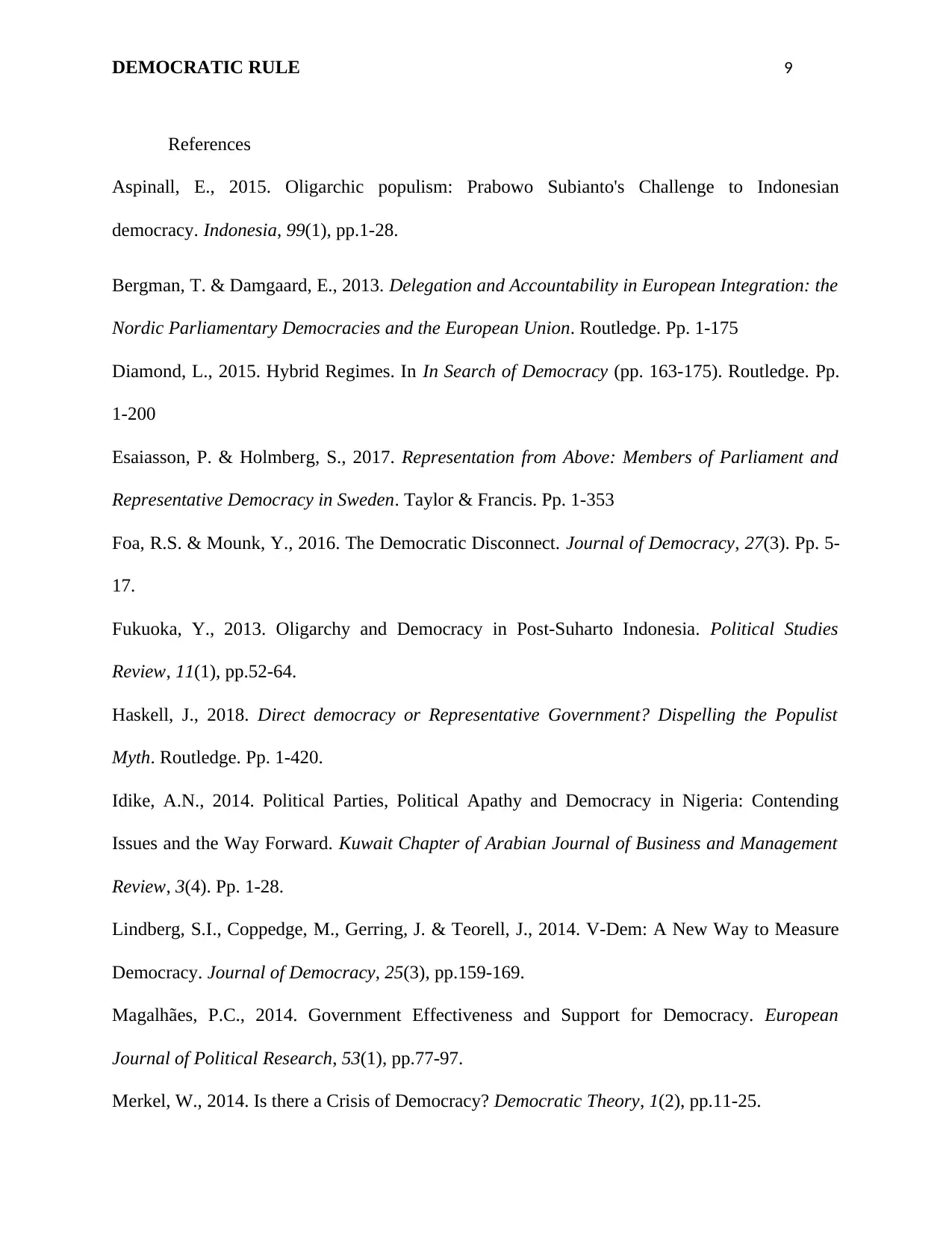
DEMOCRATIC RULE 9
References
Aspinall, E., 2015. Oligarchic populism: Prabowo Subianto's Challenge to Indonesian
democracy. Indonesia, 99(1), pp.1-28.
Bergman, T. & Damgaard, E., 2013. Delegation and Accountability in European Integration: the
Nordic Parliamentary Democracies and the European Union. Routledge. Pp. 1-175
Diamond, L., 2015. Hybrid Regimes. In In Search of Democracy (pp. 163-175). Routledge. Pp.
1-200
Esaiasson, P. & Holmberg, S., 2017. Representation from Above: Members of Parliament and
Representative Democracy in Sweden. Taylor & Francis. Pp. 1-353
Foa, R.S. & Mounk, Y., 2016. The Democratic Disconnect. Journal of Democracy, 27(3). Pp. 5-
17.
Fukuoka, Y., 2013. Oligarchy and Democracy in Post-Suharto Indonesia. Political Studies
Review, 11(1), pp.52-64.
Haskell, J., 2018. Direct democracy or Representative Government? Dispelling the Populist
Myth. Routledge. Pp. 1-420.
Idike, A.N., 2014. Political Parties, Political Apathy and Democracy in Nigeria: Contending
Issues and the Way Forward. Kuwait Chapter of Arabian Journal of Business and Management
Review, 3(4). Pp. 1-28.
Lindberg, S.I., Coppedge, M., Gerring, J. & Teorell, J., 2014. V-Dem: A New Way to Measure
Democracy. Journal of Democracy, 25(3), pp.159-169.
Magalhães, P.C., 2014. Government Effectiveness and Support for Democracy. European
Journal of Political Research, 53(1), pp.77-97.
Merkel, W., 2014. Is there a Crisis of Democracy? Democratic Theory, 1(2), pp.11-25.
References
Aspinall, E., 2015. Oligarchic populism: Prabowo Subianto's Challenge to Indonesian
democracy. Indonesia, 99(1), pp.1-28.
Bergman, T. & Damgaard, E., 2013. Delegation and Accountability in European Integration: the
Nordic Parliamentary Democracies and the European Union. Routledge. Pp. 1-175
Diamond, L., 2015. Hybrid Regimes. In In Search of Democracy (pp. 163-175). Routledge. Pp.
1-200
Esaiasson, P. & Holmberg, S., 2017. Representation from Above: Members of Parliament and
Representative Democracy in Sweden. Taylor & Francis. Pp. 1-353
Foa, R.S. & Mounk, Y., 2016. The Democratic Disconnect. Journal of Democracy, 27(3). Pp. 5-
17.
Fukuoka, Y., 2013. Oligarchy and Democracy in Post-Suharto Indonesia. Political Studies
Review, 11(1), pp.52-64.
Haskell, J., 2018. Direct democracy or Representative Government? Dispelling the Populist
Myth. Routledge. Pp. 1-420.
Idike, A.N., 2014. Political Parties, Political Apathy and Democracy in Nigeria: Contending
Issues and the Way Forward. Kuwait Chapter of Arabian Journal of Business and Management
Review, 3(4). Pp. 1-28.
Lindberg, S.I., Coppedge, M., Gerring, J. & Teorell, J., 2014. V-Dem: A New Way to Measure
Democracy. Journal of Democracy, 25(3), pp.159-169.
Magalhães, P.C., 2014. Government Effectiveness and Support for Democracy. European
Journal of Political Research, 53(1), pp.77-97.
Merkel, W., 2014. Is there a Crisis of Democracy? Democratic Theory, 1(2), pp.11-25.
⊘ This is a preview!⊘
Do you want full access?
Subscribe today to unlock all pages.

Trusted by 1+ million students worldwide
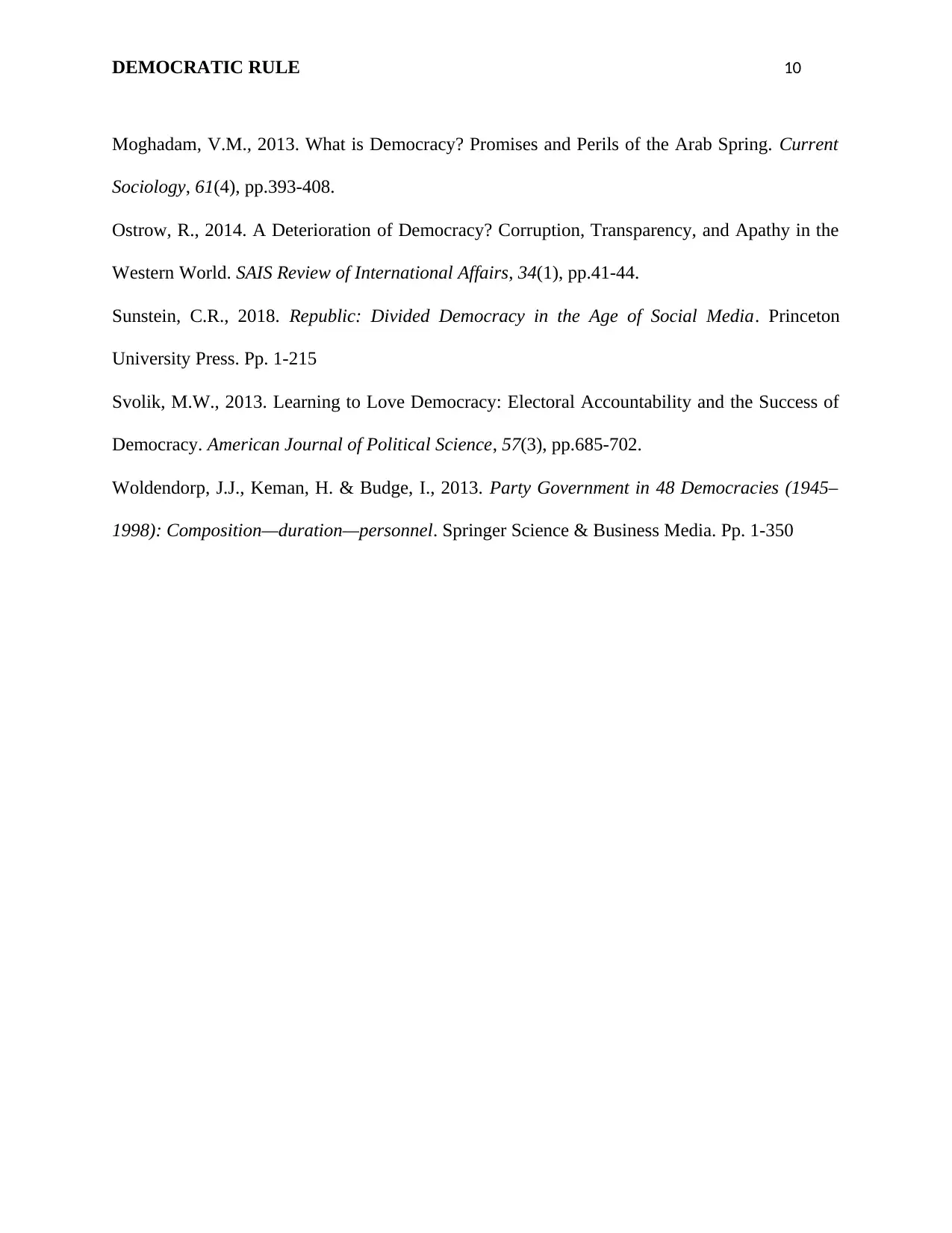
DEMOCRATIC RULE 10
Moghadam, V.M., 2013. What is Democracy? Promises and Perils of the Arab Spring. Current
Sociology, 61(4), pp.393-408.
Ostrow, R., 2014. A Deterioration of Democracy? Corruption, Transparency, and Apathy in the
Western World. SAIS Review of International Affairs, 34(1), pp.41-44.
Sunstein, C.R., 2018. Republic: Divided Democracy in the Age of Social Media. Princeton
University Press. Pp. 1-215
Svolik, M.W., 2013. Learning to Love Democracy: Electoral Accountability and the Success of
Democracy. American Journal of Political Science, 57(3), pp.685-702.
Woldendorp, J.J., Keman, H. & Budge, I., 2013. Party Government in 48 Democracies (1945–
1998): Composition—duration—personnel. Springer Science & Business Media. Pp. 1-350
Moghadam, V.M., 2013. What is Democracy? Promises and Perils of the Arab Spring. Current
Sociology, 61(4), pp.393-408.
Ostrow, R., 2014. A Deterioration of Democracy? Corruption, Transparency, and Apathy in the
Western World. SAIS Review of International Affairs, 34(1), pp.41-44.
Sunstein, C.R., 2018. Republic: Divided Democracy in the Age of Social Media. Princeton
University Press. Pp. 1-215
Svolik, M.W., 2013. Learning to Love Democracy: Electoral Accountability and the Success of
Democracy. American Journal of Political Science, 57(3), pp.685-702.
Woldendorp, J.J., Keman, H. & Budge, I., 2013. Party Government in 48 Democracies (1945–
1998): Composition—duration—personnel. Springer Science & Business Media. Pp. 1-350
1 out of 10
Related Documents
Your All-in-One AI-Powered Toolkit for Academic Success.
+13062052269
info@desklib.com
Available 24*7 on WhatsApp / Email
![[object Object]](/_next/static/media/star-bottom.7253800d.svg)
Unlock your academic potential
Copyright © 2020–2026 A2Z Services. All Rights Reserved. Developed and managed by ZUCOL.




